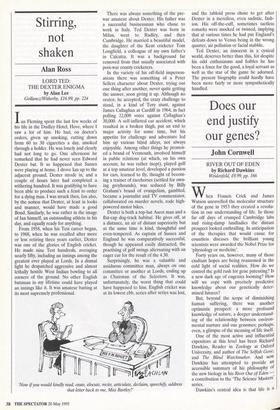Stirring, not shaken
Alan Ross
LORD TED: THE DEXTER ENIGMA by Alan Lee Gollancz/Witherby, £16.99, pp. 224 Ian Fleming spent the last few weeks of his life in the Dudley Hotel, Hove, where I saw a lot of him. He had, on doctor's orders, given up smoking, cutting down from 60 to 30 cigarettes a day, smoked through a holder. He was lonely and clearly had not long to go. One afternoon he remarked that he had never seen Edward Dexter bat. It so happened that Sussex were playing at home. I drove Ian up to the adjacent ground, Dexter strode in, and a couple of hours later had completed a withering hundred. It was gratifying to have been able to produce such a feast to order for a dying man. I was struck then, Ian also, by the notion that Dexter, at least in looks and manner, would have made a good Bond. Similarly, he was rather in the image of Ian himself, an outstanding athlete in his day, and equally ready for anything.
From 1958, when his Test career began, to 1968, when he was recalled after more or less retiring three years earlier, Dexter was one of the glories of English cricket. He made nine Test hundreds, averaging nearly fifty, including an innings among the greatest ever played at Lords. In a dismal light he despatched aggressive and almost lethally hostile West Indian bowling to all corners of the ground. No other English batsman in my lifetime could have played an innings like it. It was amateur batting at its most supremely professional. There was always something of the pre- war amateur about Dexter. His father was a successful businessman who chose to work in Italy. Ted Dexter was born in Milan, went to Radley, and then Cambridge. He married a beautiful model, the daughter of the Kent cricketer Tom Longfield, a colleague of my own father's in Calcutta. It was a background far removed from that usually associated with post-war county cricketers.
In the variety of his off-field imperson- ations there was something of a Peter Sellers character about Dexter, trying out one thing after another, never quite getting the answer, soon giving it up. Although no orator, he accepted, the crazy challenge to stand, in a kind of Tory stunt, against James Callaghan at Cardiff in 1964, in fact polling 22,000 votes against Callaghan's 30,000. A self-inflicted car accident, which resulted in a broken thigh, put an end to major activity for some time, but his appetite for challenge and adventure led him up various blind alleys, not always enjoyable. Among other things he promot- ed a brand of Vermouth, involved himself in public relations (at which, on his own account, he was rather inept), played golf at a top amateur level, developed a passion for cars, learned to fly, thought of becom- ing a trainer of racehorses (settled for own- ing greyhounds), was seduced by Billy Graham's brand of evangelism, gambled, became a journalist and TV commentator, collaborated on murder novels, rode high- powered motor bikes.
Dexter is both a top-hat Ascot man and a flat-cap dog-track habitué. He gives off, at a distance, an air of distant superiority but at the same time is kind, thoughtful and even-tempered. As captain of Sussex and England he was comparatively successful, though he appeared easily distracted, the practising of golf swings alternating with an eager ear for the result of the 4.30.
Surprisingly, he was a valuable and assiduous committee man, always on one committee or another at Lords, ending up as Chairman of the Selectors. It was, unfortunately, the worst thing that could have happened to him. English cricket was at its lowest ebb, series after series was lost, `Now if you would kindly read, orate, elocute, recite, articulate, declaim, speechify, address that letter back to me, Miss Bartley?' and the tabloid press chose to get after Dexter in a merciless, even sadistic, fash- ion. His off-the-cuff, sometimes tactless remarks were mocked or twisted, implying that at various times he had put England's defeats down to Venus being in the wrong quarter, air pollution or facial stubble.
Ted Dexter, an innocent in a cynical world, deserves better than this, for despite his odd enthusiasms and foibles he has been a force for the good, a loyal servant as well as the star of the game he adorned. The present biography could hardly have been more fairly or more sympathetically handled.


































































 Previous page
Previous page